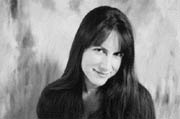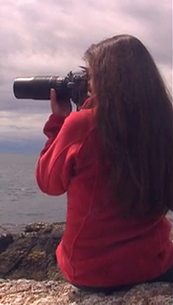
|
Words on Music
|
 |
 |
 |
|
 |
|
I heard a fellow composer comment the other day about how pieces of music sometimes seem to write themselves. Yeah, it's amazing. I mean, just the other morning, as I awoke I thought I heard some sounds coming from the kitchen, maybe a leaking faucet or a toaster oven beep. When I got out of bed, lo and behold, there was a manuscript of a pretty darn good piano trio just sitting on the counter next to the coffee maker, waiting for me. Those pots and pans must have worked all night to cook something like this up on their own! Those rascals. And it's got a catchy tune, too.
Recently I’d become stuck while working on a commission that was definitely not writing itself. If anything, it seemed determined to unwrite each measure that I coaxed from my temporarily wracked, museless brain, because when I listened back to each miserable attempt at a start, the sole inspiration I possessed was to immediately erase it from the page. So there I was, bumbling around looking for a suitable theme for this new piece with its looming delivery deadline, and nothing particularly compelling was coming to mind. Business as usual. |
| After a reasonable amount of pencil chewing, cat petting, email checking, almond munching, drawer reorganizing and writing and erasing, I was about ready to give up for the night. It’s easy enough to write down a note. Nearly any note will do. But often, the hardest thing about composing is just coming up with the all-important and necessary second note. |
|
|
Inspired by the potent combination of sheer frustration and admitted laziness, I wandered over to my piano where I keep a small stack of various shards of manuscript paper on which I've scribbled random inklings of ideas over time. A personal cache of previous attempts: my very own musical recycling program. In a pinch, why not steal from myself? Ah, the joy of auto-plagiarizing!
I started to thumb through the pile, discarding one idea after the other not so much for it's lack of worth (though hardly an impossibility), but for its inappropriateness for the intended instrumentation of this piece. Then I came across a relic from my film scoring days nearly a decade before: the main title theme of a film I was hired to score that never got made, because the producers lost their financing. I remembered being really fond of this music at the time, and no one ever got to hear it. It was right around this period that in the wake of not one, but three such debacles with clients who suddenly found themselves without funds, that I realized I was tired of having my creative life tethered to other people's business life, and my concert music career was born. Now perhaps it was payback time after all these years. |
|
So like a little dung beetle, I happily rolled my music and myself back down the hallway to the studio, where I began the process of dissecting the remains of notes long ago disposed of, and turning them into a new piece. Adding to this evening of bemused and oddly guilt-tinged productivity, I came across a little four-note motif in this musical compost that I had unknowingly used in yet another chamber work a few years ago, having never before referred to this papyral artifact. It was a jolt to realize just how consistent I was in my taste and note choices over time.
It has been said by more than a few people that composers spend their entire careers writing and re-writing the same thematic ideas, haunted by certain intervals and rhythms in their search for musical expression. Without question, it is this very neurosis that makes a composer’s voice unique and why we sound like ourselves. A familiar quote from some clever creative thief is "if you're going to steal, steal from the best." In the case of a tussle with writer's block, if perhaps not the best, certainly the most honest theft will always be that of stealing from oneself.
©2008 Alex Shapiro |
 |
Speaking to My Condition |
|
There are two big considerations which effect the way I hear music, each actually having more to do with me than with what I'm hearing. No, really, I'm not that much of a narcissist. Almost, but not quite. Here we go: Whether or not a piece has merit, if for whatever reason I'm not in the particular mood to hear it, I may very well not like it. When this happens, I'm more inclined to say that the piece didn't "speak to my condition," meaning that I'm loath to label it with a negative judgment, and more apt to see my own limitations during the time I experienced it. Something incredibly slow and minimal when I'm antsy, or something frenetic when I'm meditative, and... fugghedaboutit. Oh, and of course, Music on Hold, because even if they've got Stravinsky's "Rite of Spring" playing, all I wanna do is talk to a friggin' live person. NOW. And if they ain't speakin' to me, they definitely ain't speaking to my condition. |
The second consideration has to do with personal intent and passion, something I've learned a lot about over the course of a decade as the moderator of an ongoing event in Los Angeles called Composers Salons, curated by composer Kubilay Uner and initially, held under the aegis of The American Composers Forum of Los Angeles. In short, every two or three months about 50 composers gather together at a local club or studio where four comrades each present some of their recent work, often performed live, followed by a lot of far-ranging conversation among everyone. It's a lot of fun, to say the least (full disclosure: wine and beer are also involved), and the afternoon is incredibly eye-opening. Over the course of all these Salons, plus a number of "Composer to Composer" interviews I've done at premieres of pieces at Walt Disney Concert Hall and elsewhere, I've interviewed over 100 composers. It's been a real joy to have the chance to learn a bit about so many ways of creating. And a personal challenge, as well. |
|
One of the hallmarks of Los Angeles music is that you'd be hard pressed to find more stylistic diversity in any one geographical area. The offerings are unique and mind blowing, and reach across every musical boundary imaginable. At the Salons, this beautiful variety is reflected in my guests, who come from all edges of the music world. During the same afternoon, there are Pulitzer, Grammy, Tony, Emmy or Oscar winners featured as guests (as well as in the intimate audience), right along side others of whom most had never heard. There have been those who live in the realm of ambient electronics and those who prefer the sanctity of chamber ensembles. I've hosted composers whose talents are in musical theatre, in African drumming, in choral and symphonic writing, and in improvisational jazz. More than a few have presented their music on instruments they've invented and built. One highly respected colleague spoke more about mathematics and algorithms than he did about music. And another donned a white glove and painstakingly ran his finger across the azimuth of a vintage reel-to-reel machine as his cellist duet partner played into a mic, looping the whole track against itself repeatedly as he went. Never a dull moment. Especially for me. |
My job as I see it, is to keep the stage as warm and inviting a place as possible and to make my potentially vulnerable colleague feel exceptionally comfortable sharing his or her work. Interestingly— and in an odd way, reassuringly— my guests who happen to be famous have almost always been just as humble and as slightly nervous as all their lesser known colleagues. The camaraderie is quite touching. I do my best to anticipate the questions on the minds of others as we listen, and I use my own curiosity as an organic start for the conversation which follows the performance. But as you might imagine, there are a few times when I'm thinking to myself, "Yikes! What the heck am I gonna do with this??" and other less polite things. Either my interviewee possesses the charisma of a tree sloth, or (far more rarely, thank goodness), the music that's unfolding before us is... well... not quite speaking to the condition of anyone within earshot. |
But my game face remains, and I've learned that even during the most challenging moments, there's always something interesting to talk about, whether the music spoke to me or not. Because what's primary here and really at the crux of why we all do what we do, is that even if those of us listening don't "get it," the person who created these sounds does, and passionately. I'm touched and inspired by someone's genuine focus, effort and vision, and whether or not it translates to others is secondary to the real reason the notes escaped from this one person's head to begin with. So I applaud and support the creative impulse, even if I don't care for the created result. There are many instances where upon reading a nasty review in the paper riddled with sweeping, negative proclamations about a colleague's new work, I wish with all my heart that music critics could bring themselves to adopt the point of view above. If these writers could simply inform their readership rather than poison them against something or someone, then everyone could be invited to experience for themselves music that might indeed speak to their condition. Or learn, as I have, to find the magic even in that which does not. ©2008 Alex Shapiro |
|
Want some more? Along with photos and music? For ten years beginning in 2006, Alex published a personal, pixelsonic blog called Notes from the Kelp, that has developed a following of thousands of readers each month. She pairs snapshots from her daily life by the sea with audio clips of fitting pieces of her music, and welcomes comments. It's Alex's contribution to virtual tourism! Join her in Kelpville, and see where her music really comes from. Enter another world, here
|
Click for more essays on: |
 |
||

©2000-2024
by Alex Shapiro. All rights reserved to design and content.

